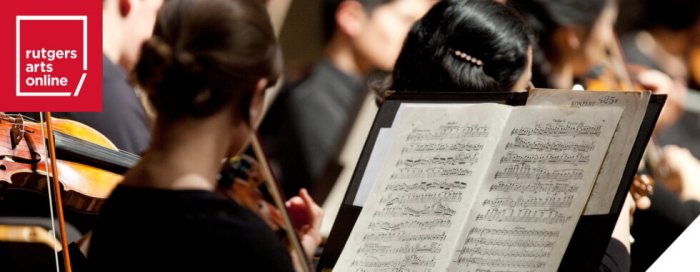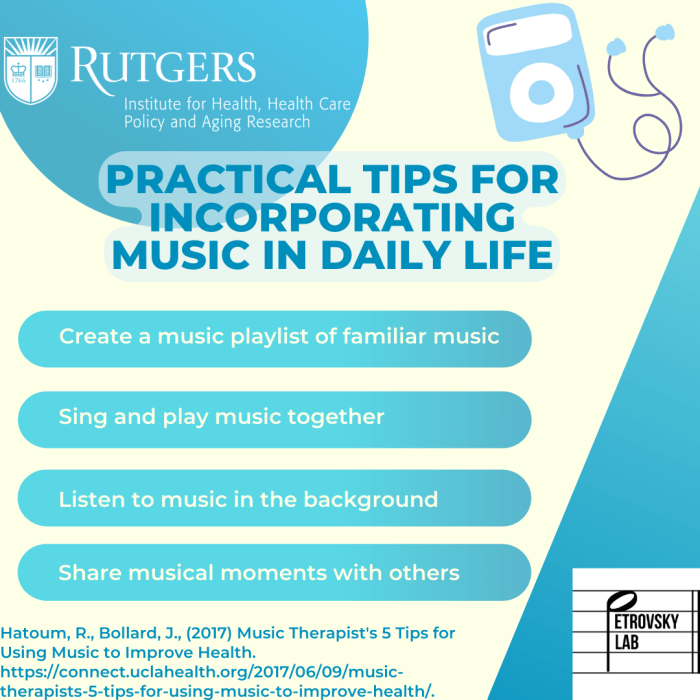Introduction to music online rutgers – Embark on a musical journey with Rutgers’ renowned online music programs, offering flexibility, accessibility, and an exceptional learning experience that empowers students to explore their musical passions and achieve their artistic aspirations.
Our comprehensive online music courses provide a structured and engaging curriculum, fostering interactive learning through virtual environments and state-of-the-art online platforms.
Overview of Online Music Education at Rutgers

Rutgers University offers a diverse range of online music programs and courses designed to cater to the needs of students seeking flexible, accessible, and affordable music education. These programs provide students with the opportunity to pursue their musical passions and develop their skills from the comfort of their own homes.Online
music programs at Rutgers include the Bachelor of Music in Music Education, Master of Music in Music Education, and Master of Arts in Music. These programs combine rigorous academic coursework with practical, hands-on experiences to prepare students for careers in music education, performance, and research.
Students benefit from access to world-renowned faculty, state-of-the-art facilities, and a supportive learning environment.The benefits of online music education at Rutgers extend beyond flexibility and accessibility. Online courses offer students the opportunity to learn at their own pace, engage in interactive discussions with peers and instructors, and access a wide range of resources and materials.
Additionally, online programs often feature affordable tuition rates and flexible payment plans, making them accessible to students from all backgrounds.Successful online music students at Rutgers have demonstrated a strong commitment to their studies and a passion for music. They have leveraged the flexibility of online learning to balance their academic pursuits with other commitments, such as work and family responsibilities.
Many online music students have gone on to successful careers in music education, performance, and other music-related fields.
Course Structure and Content: Introduction To Music Online Rutgers

Online music courses at Rutgers are typically structured to provide a comprehensive and engaging learning experience. They are designed to accommodate the diverse learning styles and schedules of students, allowing them to access course materials and participate in discussions from anywhere with an internet connection.Courses
typically follow a modular format, with each module covering a specific topic or concept. Modules may include video lectures, readings, interactive exercises, and discussion forums. Students can progress through the modules at their own pace, allowing them to tailor their learning experience to their individual needs.
Student Interaction
In a virtual environment, students interact with instructors and classmates through various online platforms. Discussion boards provide a space for students to ask questions, share ideas, and engage in asynchronous discussions with their peers. Video conferencing tools, such as Zoom or Microsoft Teams, allow for real-time interaction during virtual office hours, group projects, and class presentations.
Online Learning Platforms
Rutgers utilizes a range of online learning platforms to deliver its online music courses. These platforms provide a central hub for students to access course materials, participate in discussions, and submit assignments. The platforms are user-friendly and designed to enhance the student learning experience.
Discussion Boards
Discussion boards are a key component of online music courses at Rutgers. They foster a sense of community and collaboration among students, allowing them to engage with each other and with the instructor. Students can post questions, share resources, and participate in threaded discussions on various topics related to the course content.
Video Conferencing
Video conferencing tools play a vital role in online music courses by enabling real-time interaction between students and instructors. Students can attend virtual office hours, participate in group projects, and present their work to the class in a virtual setting.
This technology helps to create a more personal and engaging learning experience.
Faculty and Support Services

Rutgers University boasts a team of highly experienced and qualified faculty members who are dedicated to providing exceptional online music education.
These faculty members possess extensive knowledge and expertise in their respective fields, ensuring that students receive a comprehensive and up-to-date education. They are passionate about music and committed to fostering a supportive and engaging learning environment for all students.
Support Services
In addition to the dedicated faculty, Rutgers offers a range of support services to assist online music students in their academic journey.
- Tutoring:Online music students have access to free tutoring services provided by experienced music instructors. These tutors can provide personalized assistance with coursework, assignments, and performance preparation.
- Advising:Students are assigned academic advisors who provide guidance on course selection, degree planning, and career exploration. Advisors can also assist with any academic or personal challenges that students may encounter.
- Technical Assistance:The university provides technical support to ensure that students have a seamless online learning experience. This support includes assistance with accessing course materials, using online platforms, and troubleshooting any technical issues.
Student Testimonials
Online music students at Rutgers have consistently praised the quality of faculty and support services available to them.
“The faculty are incredibly knowledgeable and supportive. They are always willing to go the extra mile to help students succeed.”
Online Music Student
“The tutoring services have been invaluable to me. I have been able to improve my playing and composition skills significantly with the help of my tutor.”
Online Music Student
Technology Requirements and Accessibility

Participating in online music courses at Rutgers requires access to specific technologies to ensure a seamless learning experience. Students should possess a reliable computer or laptop with a stable internet connection. The recommended minimum system requirements include a processor with at least 2 GHz speed, 4 GB of RAM, and sufficient storage space.
Rutgers University recognizes that students may encounter accessibility challenges while engaging in online learning. The university provides various support resources to accommodate these challenges. Students with disabilities are encouraged to contact the Office of Disability Services (ODS) to discuss their specific needs and request reasonable accommodations.
Recommended Technology for Seamless Learning
- Headphones or speakers for optimal audio quality
- Microphone for effective participation in synchronous sessions
- Webcam for video conferencing and interactions
- Music software and digital audio workstation (DAW) as specified by the course instructor
- Music keyboard or other instruments as required for coursework
Career Opportunities for Online Music Graduates

Graduates of online music programs at Rutgers are well-equipped to pursue a wide range of careers in the music industry. The programs provide a comprehensive curriculum that covers all aspects of music, from theory and history to performance and technology.
This broad-based education gives graduates the skills and knowledge they need to succeed in a variety of settings.
Music Education
Many graduates of online music programs at Rutgers go on to become music educators. They are qualified to teach music at all levels, from elementary school to college. Music educators play a vital role in the development of young musicians, and they help to instill a lifelong love of music in their students.
Performance, Introduction to music online rutgers
Other graduates of online music programs at Rutgers pursue careers as performers. They may perform as soloists, in ensembles, or as members of orchestras or bands. Performers must have a high level of technical skill and musicianship, and they must be able to connect with audiences on a personal level.
Other Related Fields
In addition to music education and performance, graduates of online music programs at Rutgers may also pursue careers in other related fields, such as music therapy, music production, and music journalism. Music therapists use music to help people with physical, emotional, and cognitive challenges.
Music producers work with musicians to create and record music. Music journalists write about music for newspapers, magazines, and websites.
Clarifying Questions
What are the benefits of online music education at Rutgers?
Flexibility, accessibility, affordability, and access to experienced faculty.
What technology requirements are necessary for online music courses?
Reliable internet connection, computer with webcam and microphone, and music software.
How do students interact with instructors and classmates in online music courses?
Through online learning platforms, discussion boards, video conferencing, and virtual ensemble rehearsals.
What career opportunities are available to graduates of online music programs?
Music education, performance, music therapy, music production, and other related fields.